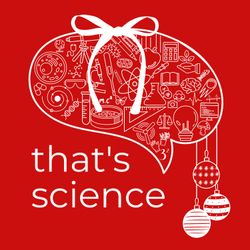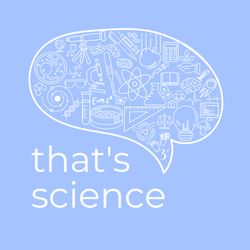Latest episode

Bonus Episode: 2023 Round-Up with Susan and Amelia
24:37|In the spirit of A Christmas Carol, we've created a sort of That's Science ghost of Past, present, and Future! In this bonus Christmas episode, Amelia and Susan wrap up the past year of That's Science by looking back over the past sixteen episodes. As well as behind-the-scenes stories and recording disasters, we also get into what we've been up to since June and what to expect in the new year from us! Thank you to everyone who listened this year, we're immensely proud of what we've created and couldn't have done it without all you lovely listeners!Happy Christmas!
More episodes
View all episodes

16. Episode 16: Scientific Discoveries with Matthew Cobb
39:02||Season 1, Ep. 16In this episode of What’s Science, Amelia discusses scientific discoveries with science historian and lecturer in zoology, Matthew Cobb. The pair chat maggot noses, fictitious ah-ha moments and less than accurate depictions of scientists while trying to work out what exactly a scientific discovery is. Make sure to listen to our outro to get a That’s Science update from Episode 1.For more on:Matthew and Nathaniel’s Nature article: https://www.nature.com/articles/d41586-023-01313-5Matthew and Nathaniel’s Twitter thread: https://twitter.com/matthewcobb/status/1650877644529975296Twitter thread showing the Royal Society programme: https://twitter.com/ThatsSciencePod/status/1667178396093231104?s=20Progress in Science (a historical overview of different theories by Feller and Stern: https://www.ncbi.nlm.nih.gov/books/NBK26378/The nature of discovery: https://www.ncbi.nlm.nih.gov/pmc/articles/PMC4213439/
15. Episode 15: Education and Illustration with Phoebe Holden
35:00||Season 1, Ep. 15CW: Discussions of consent and sex This week's episode of 'Is that Science?' Phoebe joins me and Amelia to talk about her work as a sex educator and illustrator. Our conversation ranges from all things gender and sexuality to science communication and the arts. We hope you enjoy this conversation as much as we loved having it :))Phoebe's Instagrams: Art page: https://instagram.com/everybodys_invited?igshid=MzRlODBiNWFlZA==Personal: https://instagram.com/phoebeebies?igshid=MzRlODBiNWFlZA==For more on:The Vagina Museum: https://www.standard.co.uk/culture/exhibitions/the-vagina-museum-london-camden-twitter-public-support-new-venue-b948844.htmlhttps://twitter.com/vagina_museum?lang=enFrances Glesner Lee's Crime Scenes: https://americanart.si.edu/exhibitions/nutshells
14. Episode 14: Uncertainty, Error and Science with Alex Cullen
31:11||Season 1, Ep. 14This week's episode of What's Science is all about statistics - much to the disappointment of our guest, Alex. Amelia and Alex navigate pandemic communication, not-so-scientific chemistry experiments and the scientific institution through caffeine- and stress-induced giggles - it's a fun one!For more information on:The definitions of Uncertainty and Error: https://www.visionlearning.com/en/library/Process-of-Science/49/Uncertainty-Error-and-Confidence/157Uncertainty in Science Communication: https://www.forbes.com/sites/chadorzel/2015/10/08/the-certainty-of-uncertainty-scientists-know-exactly-how-well-we-dont-know-things/Communicating statistics during the Pandemic: https://www.sciencedirect.com/science/article/pii/S2666389921001537
13. Episode 13: The Political History of the Climate Crisis with Dr Vladmir Jankovic
31:33||Season 1, Ep. 13In this episode of "Is That Science", Dr. Vladmir Jankovic comes on to talk about the development of the climate crisis as a political issue. Despite its obvious presence in the modern day, the complexity of climate change can be incredibly hard for a non-scientific individual to talk about or understand. At times, this can feel overwhelming. So, in today's episode, Vlad will talk through the history of the crisis as a political issue, a framing goes some way to unpick some of the confusion around the issue. This was such a fascinating conversation and I'm so grateful Vlad took the time out to talk to me!For more on:Pint of Science Events: https://pintofscience.co.uk/events/manchester The language of climate change: https://www.bbc.co.uk/programmes/m000d719 and https://www.bbc.co.uk/programmes/m001gk5hIndividualization of responsibility: https://medium.com/@mitpress/individualization-plant-a-tree-buy-a-bike-save-the-world-ecb916df95e4 Vlad's paper on climate change as market transition: https://www.tandfonline.com/doi/abs/10.1080/03085147.2013.791511?tab=permissions&scroll=top
12. Episode 12: Inclusivity in Health Research with Heidi Gardner
35:13||Season 1, Ep. 12In this episode of what’s science, Amelia literally has to be told to “be cool” because she’s too excited to have Heidi Gardner, health equality researcher at the University of Aberdeen, on the podcast. The pair discuss Heidi’s PhD, why it’s important to include diverse and representative populations in clinical trials, and how that can be achieved – all while Amelia gushes about how much she loved Heidi’s past business Science On A Postcard/Little Science Co.Heidi’s Twitter: https://twitter.com/heidirgardner?s=20Heidi’s Blog: https://heidirgardner.wordpress.com/ Other people Heidi mentioned:Heather Morgan (@hm_morgan on twitter)Addy Adelaine (@AddyAdelaine on twitter)Lynn Laidlaw (@lynn_laidlaw on twitter) For more onThe Disabled Experience: Disability Visibility, edited by Alice Wong (2020)Photovoice: https://participedia.net/method/5016 or https://feelingathome.org.uk/blog/what-is-photovoice/ or https://www.tandfonline.com/doi/full/10.1080/09687599.2012.717881Inclusivity frameworks in Clinical Trials: https://www.nihr.ac.uk/documents/improving-inclusion-of-under-served-groups-in-clinical-research-guidance-from-include-project/25435
11. Episode 11: Ecocriticism with Paul Knowles
27:23||Season 1, Ep. 11TW: Discussion of suicideIn this episode, Paul Knowles joins Susan to have a chat about ecocriticism. With a lot of discussion about the climate crisis characterized by catastrophe, it is very easy to be overwhelmed by the discourse. However, in the field of ecocriticism, one has a different way to articulate the human relationship to the natural and more human world in a way that can build empathy and promote discussion in a way that hard statistics sometimes can't. Of course, it's a massive area of research and literature, but I had a great discussion with Paul and he's so knowledgeable about this work, and our discussion prompted a lot of post-interview followup web-searching on my part!For more information on:The Southern council in trouble for tree felling in Plymouth: https://www.bbc.co.uk/news/uk-england-devon-65074972A great discussion from BBC Radio 4 about preserving ancient woodlands: https://www.bbc.co.uk/programmes/m001l940